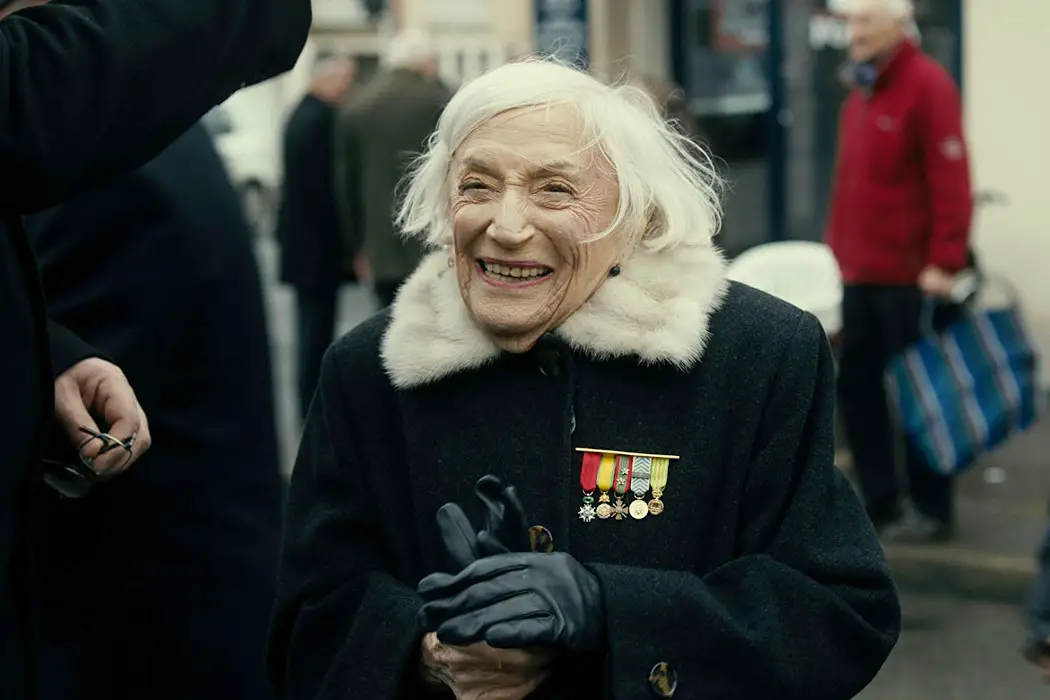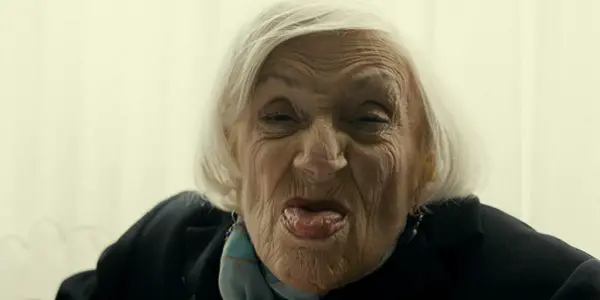CHICHINETTE: THE ACCIDENTAL SPY: What a Hero Looks Like

Lee Jutton has directed short films starring a killer toaster,…
What would I have done? It’s the question one cannot help ask when reminded of the ordinary people who survived the atrocities of the Holocaust. Would I have been brave enough to stand up to evil? Would I have helped those being persecuted and risked my own life in the process? Or would I have stood by silently, too afraid to get involved? We all want to believe we would be the former, but with millions dead in concentration camps, it’s clear that during World War II, in actuality, many were the latter.
Directed by Nicola Alice Hens, Chichinette: The Accidental Spy pays tribute to one incredibly brave woman who refused to remain on the sidelines and actively resisted the Nazis as a spy for the French Resistance. Her fortitude in the face of danger and personal tragedy — she lost a fiance and a sister during the war — helped ensure the Allies’ victory in Europe. For decades, she didn’t speak of her wartime experiences, not even to her beloved husband. But now, at the age of 99, Marthe “Chichinette” Cohn — a nickname she earned for asking her superiors in the Resistance too many questions — travels the world to share her inspiring story with others, forcing them to ask themselves the question: what would you have done?
Unlikely Asset
The titular spy was born Marthe Hoffnung — a word that in German fittingly means “hope” — in Metz in 1920. A city in the Alsace-Lorraine region, Metz has been alternately declared German or French throughout its history, which means that Marthe grew up speaking both languages fluently — a crucial skill for French Resistance spy to have. Her family was Jewish, and her grandfather played a leadership role in the local synagogue.
When the Nazis rose to power, Marthe and her sister, Stephanie, helped their fellow Jews escape to the “free zone” in the south of France. However, when a letter signed with Stephanie’s real name was intercepted by the authorities, Stephanie was arrested and sent to Auschwitz. It wasn’t until the camps were freed and Marthe, seeing the skeletal survivors in the streets, learned what had gone on inside, that she realized she’d never see Stephanie again.
This was not the only tragedy to befall Marthe during the war; her fiance, Jacques, an active member of the French Resistance who was not Jewish but declared he would convert just to marry Marthe, was captured and executed for daring to oppose the Nazis. Yet none of these horrors appear to have crushed Marthe’s spirit; if anything, they made her more determined to play a role in the Nazis’ downfall.
Sharing Her Story
In Chichinette: The Accidental Spy, Marthe narrates her wartime actions with a sparkling clarity of memory that is all the more remarkable considering her age. She trained as a nurse, joined the Resistance, and was sent behind enemy lines to the German city of Freiburg to masquerade as a German woman searching for her missing fiance. From crossing the Swiss border on foot with forged papers to hobnobbing with regular German citizens to get an idea of their morale, nothing Marthe did during the war was easy. If her true identity had been discovered — not just a spy for the enemy, but a Jewish one at that — there’s no doubt she would have died a horrific death. Yet from the way Marthe so matter-of-factly tells her story, one can see that for her, there was no other option: resistance was the only way forward.
Marthe was able to discover and pass along the crucial information that the Germans had evacuated the defensive border known as the Siegfried Line and were lying in wait in the nearby Black Forest to ambush the Allied army. It was a huge piece of intel that helped ensure that the tide of the war continued to turn toward the Allies. That it was obtained by a petite spitfire of a woman who is barely even five feet tall can’t help but remind me of a quintessential line from The Fellowship of the Ring: the notion that even the smallest person can change the course of the future.

Hens combines these interviews with archival photos and clever animation that help bring the past as Marthe speaks of it to life. One can’t help but be surprised that this documentary is the first film to have tackled Marthe’s story, as it would make a cracking period drama. Contemporary footage of places such as the eerily empty Swiss borderlands and the busy Freiburg streets helps to set the scene for Marthe’s story and make the audience feel as though they are right alongside her in 1944, pulse racing as they attempt to discover the secrets of the enemy. Now pushing a century, with white hair, a hunched back and a fragile step, Marthe still retains an inner joie de vivre as she hops around the globe with her longtime husband at her side, sharing her story so that future generations can learn from it and be inspired. Her primary message for children? Don’t ever accept an order that you don’t believe in. It’s a message that remains critical to this day, hence why Marthe refuses to rest.
Chichinette: Conclusion
The story of Chichinette: The Accidental Spy has gone too long without being told. Fortunately, this film does so admirably, paying homage to a hero while also reminding us that while World War II may be many decades in the past, the time for leaders such as Marthe Cohn is still now.
What do you think? Are you familiar with the story of Marthe Cohn? Share your thoughts in the comments below.
Chichinette: The Accidental Spy will screen at the Marlene Meyerson JCC in New York beginning December 25, 2019. You can find more international release dates here.
Does content like this matter to you?
Become a Member and support film journalism. Unlock access to all of Film Inquiry`s great articles. Join a community of like-minded readers who are passionate about cinema - get access to our private members Network, give back to independent filmmakers, and more.
Lee Jutton has directed short films starring a killer toaster, a killer Christmas tree, and a not-killer leopard. Her writing has appeared in publications such as Film School Rejects, Bitch: A Feminist Response to Pop Culture, Bitch Flicks, TV Fanatic, and Just Press Play. When not watching, making, or writing about films, she can usually be found on Twitter obsessing over soccer, BTS, and her cat.













